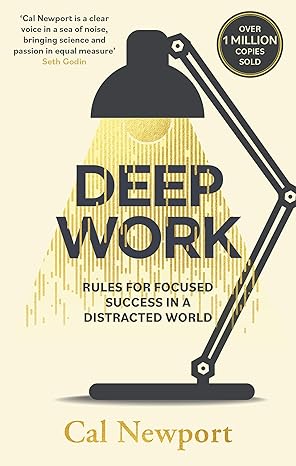The ultimate guide to thriving in a distracted world.
In a world overflowing with pings, notifications, and shallow multitasking, Deep Work by Cal Newport arrives like a breath of clarity. It’s not just a productivity book—it’s a manifesto for regaining control over your focus and producing truly meaningful work in an increasingly noisy digital age.
What is Deep Work All About?
Cal Newport, a computer science professor and productivity expert, introduces the concept of “Deep Work” as the ability to focus without distraction on cognitively demanding tasks. According to Newport, this skill is becoming increasingly rare—yet incredibly valuable—in our current economy.
The book makes a bold claim: the future belongs to those who master deep work. Whether you’re an entrepreneur, student, writer, or professional, your ability to produce high-quality work in less time is your biggest asset. Newport not only explains why deep work matters, but also shows you how to cultivate it.

Core Principles of Deep Work
1. Work Deeply
Newport lays out rituals and routines that help you get into a deep work state—free from digital distractions, shallow commitments, and constant context-switching. He encourages batching tasks and scheduling blocks of uninterrupted work.
2. Embrace Boredom
Contrary to modern productivity myths, Newport argues that constantly seeking stimulation destroys your ability to concentrate. Learning to sit in boredom is a key step in training your brain to focus when it matters most.
3. Quit Social Media
This doesn’t mean going off the grid—but Newport advises evaluating every tool by the value it provides. Most social media platforms, he argues, are designed to fragment attention, not enhance life or work.
4. Drain the Shallows
He recommends minimizing time spent on low-value activities like unnecessary emails, meetings, and admin tasks. The key is to say no more often and be brutally honest about where your time is going.
Why This Book is a Game-Changer
Newport doesn’t just theorize—he gives you practical, actionable advice grounded in research and real-world examples. From how Carl Jung built a writing tower in the woods, to how elite athletes and creatives schedule solitude for peak performance, Newport shows that deep work is not reserved for monks or geniuses—it’s for anyone willing to prioritize it.
The tone is no-nonsense, the examples are relatable, and the message is urgent: reclaim your brain before it’s too late.
Book Details
- ASIN : B013UWFM52
- Publisher : Piatkus; 1st edition (5 January 2016)
- Language : English
- File size : 1.0 MB
- Text-to-Speech : Enabled
- Screen Reader : Supported
- Enhanced typesetting : Enabled
- X-Ray : Enabled
- Word Wise : Enabled
- Print length : 305 pages
FAQs
Q1. Is Deep Work suitable for creatives and students?
A: Yes. Writers, artists, coders, and students can all benefit from mastering deep focus.
Q2. Does the book provide a system to follow?
A: It offers several strategies, including routines, scheduling, and rituals for eliminating distraction.
Q3. Is it anti-technology?
A: Not entirely. Newport isn’t against tech—he just wants you to be intentional with it.
Q4. Can I still use social media?
A: Only if it adds more value than it costs you in time and attention. It’s all about conscious use.
Q5. What’s the main outcome of applying deep work?
A: Greater productivity, deeper satisfaction from your work, and a sharper mind.
About the Author
Cal Newport is an associate professor of computer science at Georgetown University and a best-selling author of several productivity books including So Good They Can’t Ignore You and Digital Minimalism. With a passion for focus and craftsmanship in work, Newport advocates for deep, meaningful productivity over surface-level busyness. His work draws on academic research, historical examples, and personal experimentation to offer practical strategies for success in the knowledge economy.

